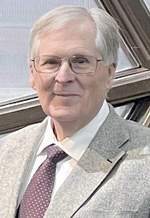By RAY ADLER
Ask Adler
 During the last two years, issues surrounding COVID-19 policies and mandates have been unending. Should we mask? Should our children go to school? What about the vaccine? What does the science say? Who should decide these issues?
During the last two years, issues surrounding COVID-19 policies and mandates have been unending. Should we mask? Should our children go to school? What about the vaccine? What does the science say? Who should decide these issues?
In general, I believe determinations about vaccinations, masking, and education are properly left to families and individuals rather than bureaucrats or “experts.”
In 1901, Winston Churchill wrote to H.G. Wells: “Nothing would be more fatal than for the government of states to get in the hands of experts. Expert knowledge is limited knowledge: and the unlimited ignorance of the plain man who knows only what hurts, is a safer guide than any vigorous direction of a specialized character. Why should you assume that all except, doctors, engineers, etc. are drones or worse?”
Recently, when criticized by members of Congress, Dr. Anthony Fauci responded by stating that those criticizing himself and his policies were really criticizing science because he (Dr. Fauci) represents science. Dr. Fauci’s rebuttal came across to me as misguided and logically fallacious.
First, Dr. Fauci seems to equate science with truth. Because Dr. Fauci, in his mind, represents truth, those who publicly challenge him are guilty of propagating falsehoods and/or misinformation. Truth and science, however, like apples and oranges, are not synonymous. Truth is an end, a reality, a state of correctness.
Science, on the other hand, is a method or process. The scientist uses science or the scientific method to formulate conclusions about the natural world in the same way as the philosopher or theologian using reason and experience to form conclusions about the metaphysical world. Thus, science, in and of itself, is not truth, nor does it necessitate an accurate conclusion.
Second, like science and truth, Dr. Fauci conflates science with policy. As stated above, science is the observation and study of the natural world. The chief end of the scientific method is the collection and synthesis of data.
For example, science is tremendous in telling us about a disease, its chemical composition, its transmissibility, and the effect it may have on the human body, but science cannot direct us on how said information can and should be used.
Policy, on the other hand, applies scientific data to the real world. Policy making is philosophical in nature and is closely tied to one’s worldview and experience. Policy making involves risk assessment, moral evaluations, and judgment calls, which explains why different individuals draw different conclusions about the same data. Thus, Dr. Fauci’s numerous and often vague appeals to “the science” in order to justify his policy positions (without more explanation) is not logically tenable.
The Great Barrington Declaration, a position paper signed by more than 50,000 doctors, scientists, and medical researchers, takes a broad approach to understanding and evaluating COVID-19 public safety measures, including considering the societal impact that shutdowns and mass isolation has on depression, suicide, loss of education, unemployment, and broken supply chains. The Great Barrington Declaration, in responding to the COVID-19 data, seeks to balance the need for protecting our vulnerable populations with the understanding that public health includes the social and emotional well-being of a society. You can read the entire declaration at gbdeclaration.org.
As we continue to consider how to combat the COVID-19 pandemic, remember that your opinion matters and is valuable. The scientific community is instrumental in understanding the virus, but nobody understands your circumstances better than yourself.
Often those in power are not really engaged in the search for truth, but instead, are looking for ways to maintain their power. As citizens of Hamilton County, the State of Indiana, and the United States, you have an opportunity to understand the issues facing our society and vote. Dr. Fauci and the “experts” do not have a monopoly on truth.
Educational material and not legal advice, written by the team at Adler attorneys. Email andrea@noblesvilleattorney.com with questions or comments.

So, truth can not be found in science. Truth can be found only in your own head, and you should take that truth with you to the ballot box. Mr. Adler engages in propaganda.
Much of the ire over covid protocols has been directed at science & the medical & public health ‘experts’
And yet, when one needs a live saving procedure or treatment, they are pretty quick to seek that same ‘expert’ assistance from the medical community.
Why not just have that 2nd cousin perform the heart stent procedure as apparently family knows best on medical matters ?
Additionally Mr. Adler ; the chief end of the scientific method is not ‘collection & synthesis’, that is the process of it.
The chief end is to prove or disprove a hypothesis – most would characterize that as arriving at some version of the truth.
It’s been disputed on occasion, but since you brought him up – Winston Churchill also stated that ‘the best argument against democracy is a five minute conversation with the average voter’.
science holds no truths. there is only hypothesis and theory. theory is a hypothesis that has stood the test of time (so far!!!!!!
I see, so apparently, the documentation of the percentage of deaths of unvaccinated individuals are also fallacious.
Listen to the deathrates observed by the CEO of Indy’s own OneAmerica Life insurance.
I trust his stats more than your expert attention!
https://www.youtube.com/watch?v=BpPlDqVibnA